Headgear to thwart mind-reading surveillance cameras by Fabrica researchers
Wearable Futures: researchers at Italian design centre Fabrica have created accessories that would deceive neuroimaging devices by diverting thoughts using electric shocks and flashing lights (+ slideshow).

Lisa Kori Chung and Caitlin Morris from Fabrica designed the anti-NIS (neuroimaging surveillance) pieces to detect when surveillance technology linked to CCTV cameras is trying to read the wearer's brainwaves. It would then focus their thoughts to something inconsequential to help maintain privacy.

They say neuroimaging technology is currently being researched and developed to read and record the thoughts of the public, with the aim to detect ill intentions before they are carried out.
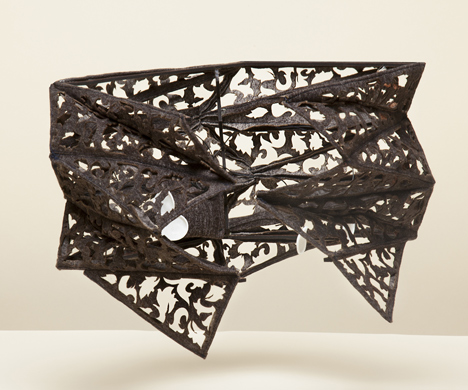
However this raises issues of privacy, so Kori Chung and Morris are proposing to mask thoughts using a range of wearable devices.
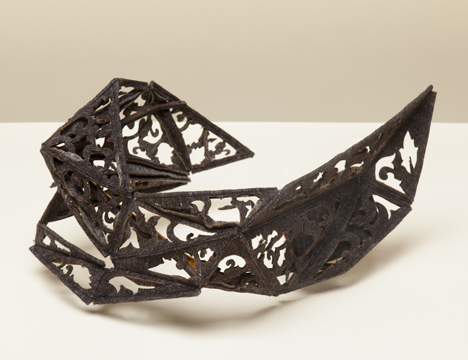
Each faceted piece covered with decorative patterns is designed to detect when the wearer is being scanned and provides a distraction to change their thought pattern.
"Rather than simply blocking access to the brain, which would require unsubtle and complex equipment, each piece proposes a method of momentary cognitive diversion," said the designers.
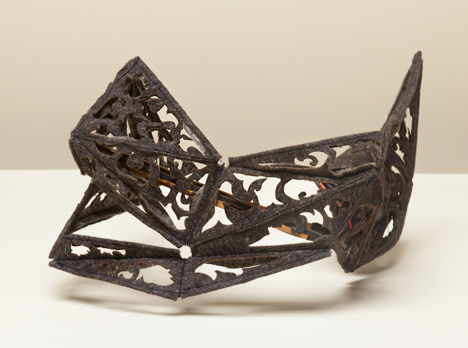
"When a scan is detected, the accessories provoke a sensory reaction that will demand the wearer's attention, changing their current brain activity patterns and affording a moment of privacy through camouflage."
The hat transmits sound pulses through the skull to the ear, the collar gives a gentle electric shock and the mask emits light flashes into the wearer's eyes.
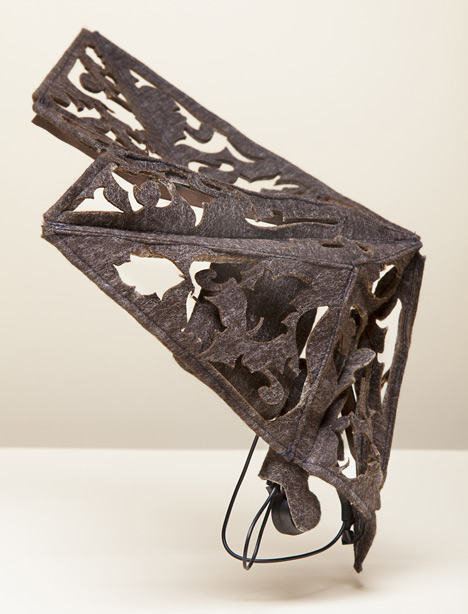
This means that at the moment of the scan, the wearer's thoughts are more likely to be read as "this light is too bright" or "that's a strange sound" rather than what their mind might have been preoccupied with otherwise.
Even though the implementation of neuroimaging technology is still science fiction, the project aims to raise awareness of other surveillance techniques currently used in conjunction with CCTV such as facial recognition, motion detection and voice analysis.

The project was designed for the Futures 10 exhibition of wearable technology, displayed last night as part of the Wearable Futures conference at Ravensbourne in London.
On the same theme of masking surveillance, Adam Harvery created a range of anti-drone clothing to hide the wearer from heat detection technologies.
Photographs are by Marco Zanin.
Here's some information the designers sent to us:
Wearables to thwart neuroimaging surveillance by Lisa Kori Chung and Caitlin Morris
The paradigm of clothing as protector and concealer is slowly shifting: increasingly, our bodies are becoming more and more public (though security practices as well as fashion choices), while new forms of neuro-imaging technology are developing that may one day allow for surveillance and interception of the contents of our minds. Anti-NIS Accessories is a series of proposed objects designed as a form of clothing that maintains privacy of thought and action.
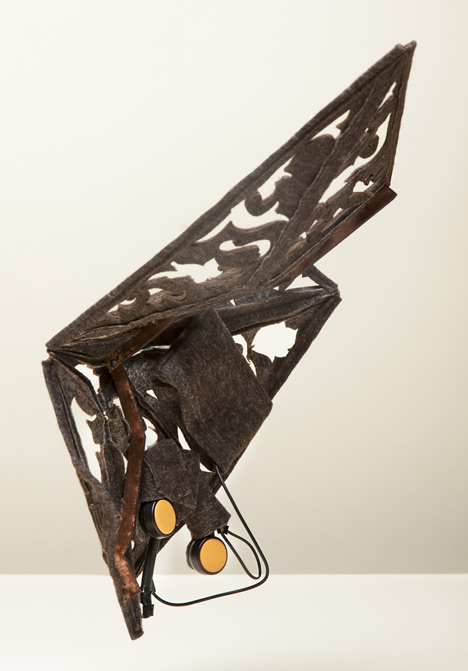
Rather than simply blocking access to the brain, which would require unsubtle and complex equipment, each piece proposes a method of momentary cognitive diversion. When a scan is detected, the accessories provoke a sensory reaction that will demand the wearer's attention, changing their current brain activity patterns and affording a moment of privacy through camouflage. The objects include a hat that transmits sound pulses through bone conduction, a collar that gives a gentle electric shock and a mask that distracts the user with flashing lights.
Can the purpose of clothing be expanded to serve a hybrid purpose: acting as an expressive covering of the body, and also maintaining privacy of things like emotions, intelligence, and even more specific "brain data"?
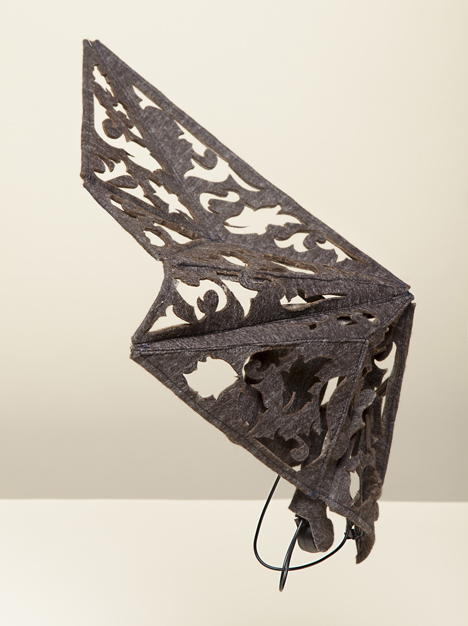
These are the wider questions we asked:
Today, closed-circuit video surveillance has become commonplace. Concurrent with its rise in ubiquity, new techniques are being developed for analysing the massive amounts of information generated. Biometric identification techniques such as FRT (facial recognition technology), gait analysis, and voice analysis are often used after an incident has taken place to try to determine the identities of the parties involved. However, now various companies are working on algorithms to detect persons acting "suspiciously" (perhaps based on activities such as running, loitering and carrying packages). We are entering a new period of algorithmic guessing of intention based on external behaviours, before an incident takes place.
What if brain-scanning could be periodically deployed in a widespread and stealthy manner in urban environments, similar to CCTV now? Already our notions of civil liberties and bodily privacy are being challenged on an everyday basis, how should they be defined in the future in terms of the mind?